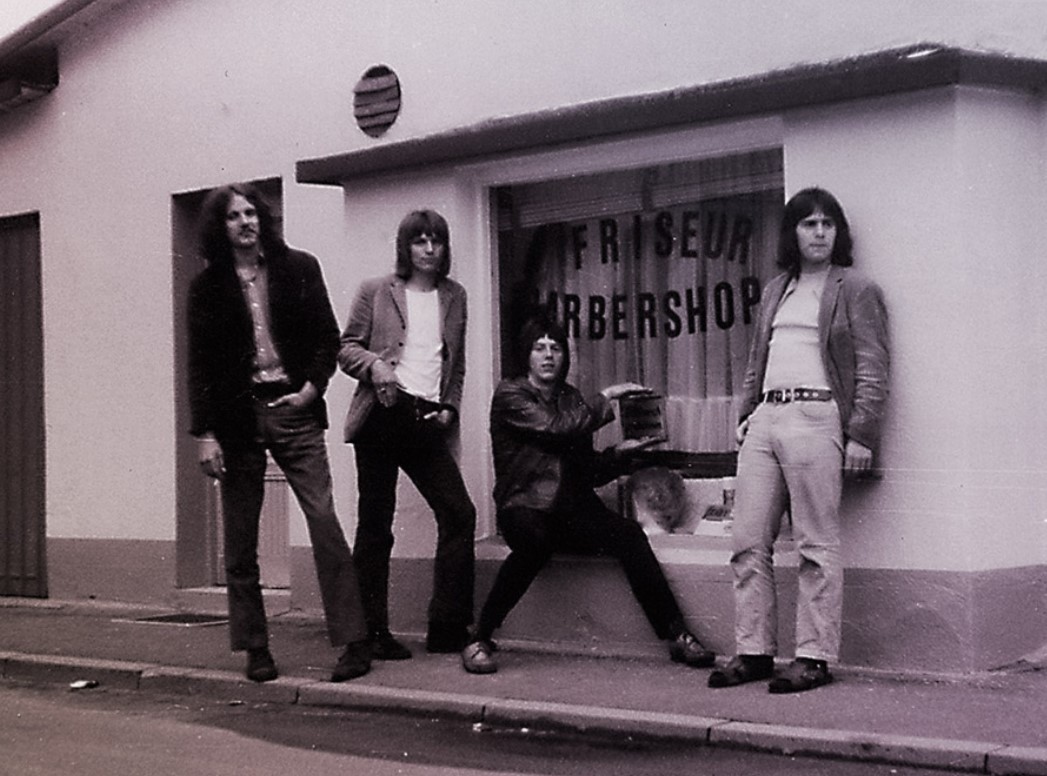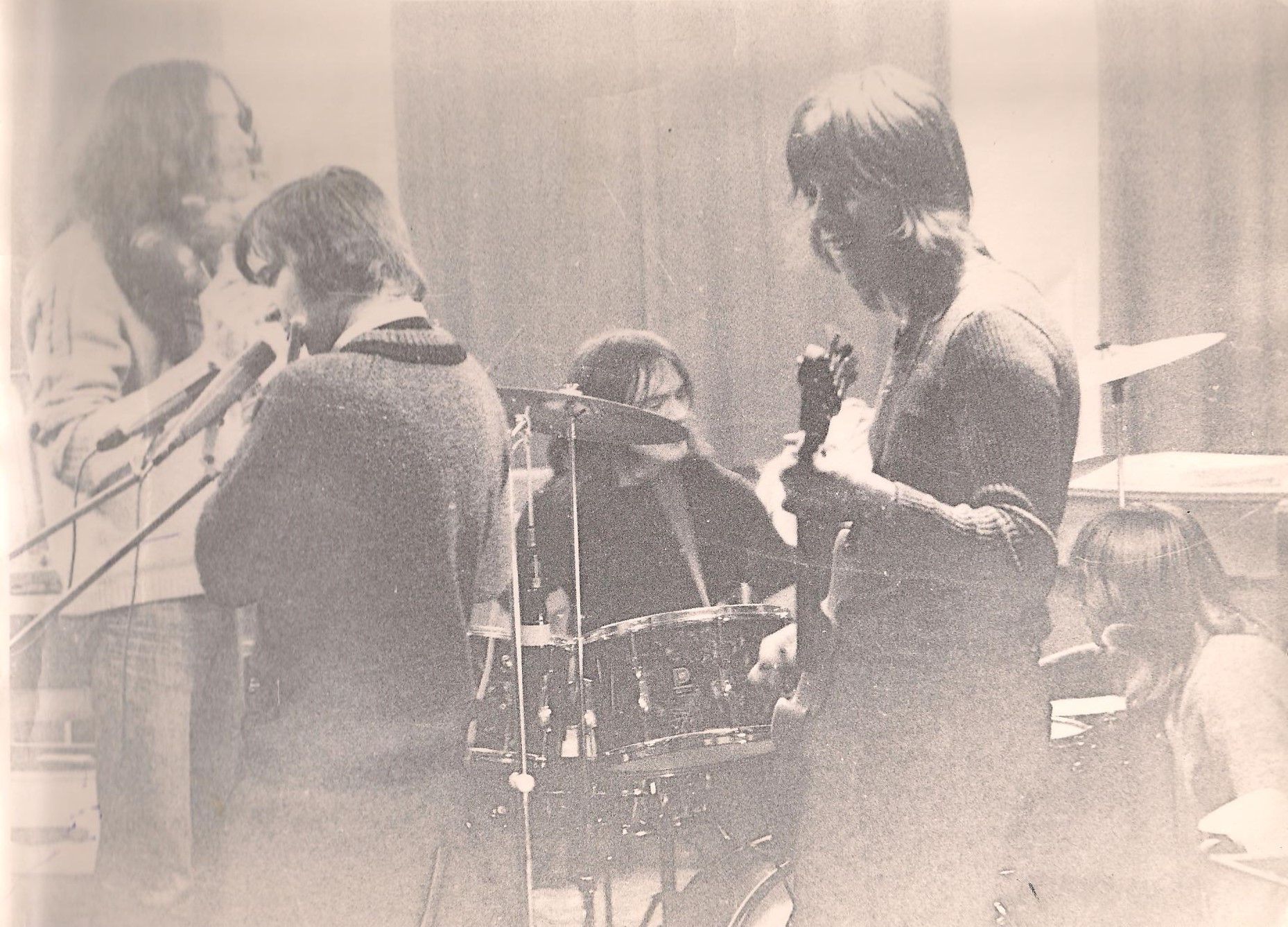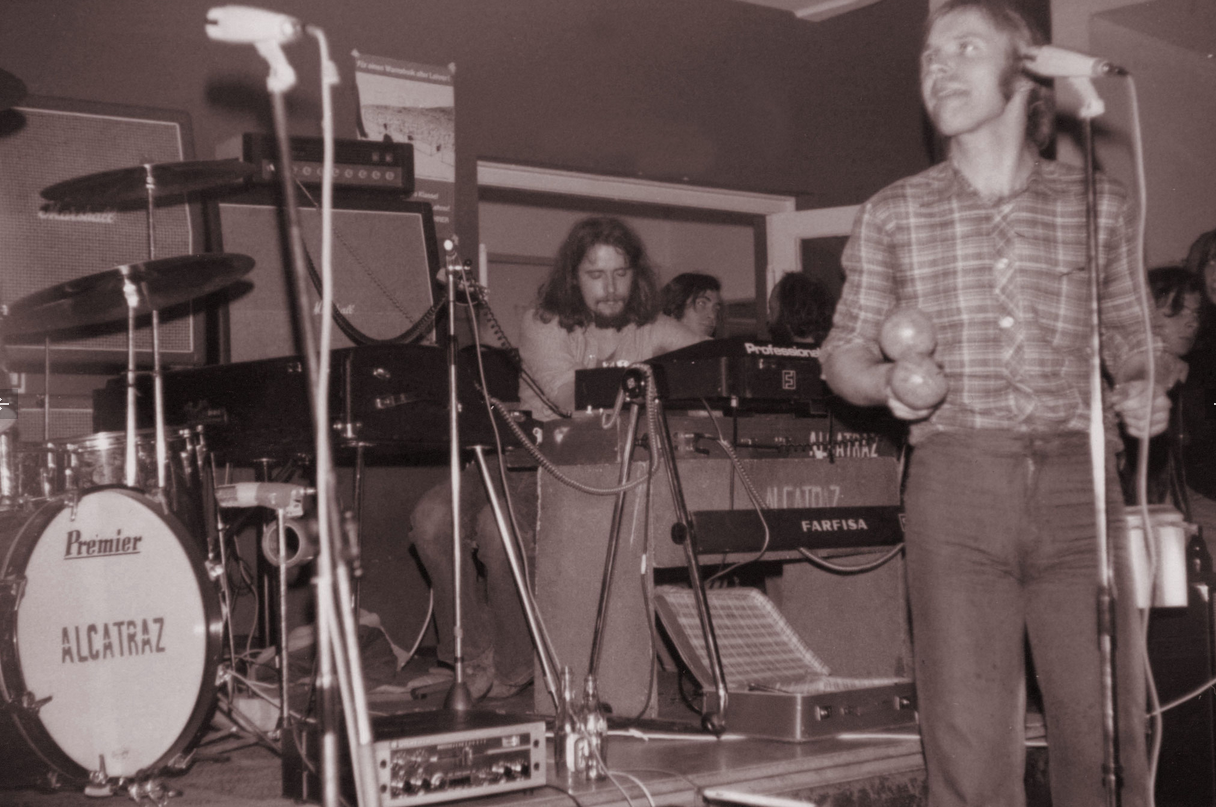Alcatraz | Legends from Hamburg
In the beginning of our interview with the Alcatraz drummer Jan Rieck, he pointed out the peculiarities of the German music scene after World War II as a result of Germany’s recent past. Jan died two years later. The project Alcatraz has thereby come to an end.
The following closing remarks by the Alcatraz founding member Rüdiger Berghahn may illustrate both the specific social background and the differences and similarities of the prog, rock, and jazz communities in Germany as compared to the most influential countries Britain and the USA.

Rüdiger Berghahn: Jan Rieck and I grew up in the suburbs Othmarschen and Blankenese, which were two of the noble districts in Hamburg. Unlike Jan, I had a middle class background. My father loved to play the piano with the focus on waltz. So I had to take piano lessons in classical music and got some basic education in music theory. However, I preferred to create my own music.
Jan and I were part of the local R&B rock scene which had come about in the sixties and had its meeting points in the two shopping streets. Like other youngsters from all over the world, we met every day after school to talk about the latest news concerning music, literature, movies, people, politics and events. Fortunately, the districts we grew up in were hotspots for rock and fusion music in Hamburg. The more hardcore even rented a former cinema, converted it to an independent music club and organized quite spectacular open air concerts with groups from Britain.
Talking about local musicians from these districts – here are some examples of who we were in touch with:
1) Max Wulff, excellent keyboarder, groups Habirigum, Yagua, and Steinzeit, the latter with female punk singer Sissi Fuss and Dionys Kube (drums), LP ‘Geburtstag’,
2) Lutz Rahn, organist of the international group Novalis, owner of the Brücken-Studio,
3) Werner Kracht, excellent guitarist and creator of the famous Cubase programme.
Jan and I visited the same grammar school. Our guitarist Klaus Holst and our bass player Ronny Wilson lived on the opposite low river bank of the Elbe river in the former fishing village Finkenwerder. At that time, Klaus was only 17 years old and had an apprenticeship at the German Shipyard, where his father worked as an electrician. The family of four lived in a tiny flat. Ronny’s father was a Scottish musician.
In early 1970, we rehearsed in the barrack of the church community in the tiny village Altenwerder, 5 kilometres away from Finkenwerder.
Klaus and Ronny came by bus and if they missed it, they had to walk. We were allowed to use the room once a week, but we had to set up and remove our equipment every time. I was a student of biology at Hamburg University. For practice with our group I always had to come by car. First I had to pass the more than 110 years old St. Pauli tunnel underneath the Elbe river. Luckily, my old Borgward light lorry just fitted the elevators and the extremely narrow street in the tunnel. Sometimes, the engine refused to get started and the workers in the harbour helped me to get the truck out of the elevator again. Then I had to cross the free port area in Hamburg’s harbour including double customs checks and had to take the car ferry to Altenwerder. The good thing about this considerable effort was that I could give Klaus and Ronny a lift back to Finkenwerder when the bus service had ended. This way, I got to know the parents of Klaus and Ronny who were very open-hearted. Their hospitality was surprising to me since in those days long-haired young people and in particular students were identified as hate targets in major parts of German society. In contrast, Klaus’ father, for example, supported our band by building speakers and light cabinets in his leisure time.
Already in the early months of 1970 we met Willi Jahnke and started to rehearse in the town of Wedel at the west border of Hamburg. The conditions in the rehearsal room were similar to those in Altenwerder. However, the room was much bigger and there was always an audience when we started to play our own songs including long improvisations. Klaus Nagurski joined us.

Like the parents of Jan Rieck and Klaus Holst, the Nagurskis were kind and open-minded. At that time his father was a worker at the German Shipyard. Later he got a job in the metalworking industry in Wedel and repeatedly helped me to get a job during times off at university. I needed the money to buy some music equipment. This meant two months of taskwork six days a week at three machines in parallel from 7 am to 8 pm. The pay was much better as compared for work in the Port of Hamburg. In the after-work hours, I was always pretty exhausted and remember well that listening to music other than horrible German pop songs was impossible.
The following two paras in italic letters are taken from Manfred Steinheuer’s text in the booklet of the CD ‘Vampire State Building’. They illustrate atmosphere and commitment.
The manager Willi Jahnke, twenty years old and full of thirst for action, knew all the tricks of the show business: visits of reporters, plastering of complete cities with Alcatraz posters, ‘selling’ the group as Dutch band. Willi Jahnke had the difficult task to market the group who didn’t compromise with promoters, the recording companies and the public as far as their music was concerned. Therefore, anger with commercial promoters couldn’t fail to materialise. The band was given the boot – on one occasion, during a going-on concert – or wasn’t engaged again at least. The musicians of Alcatraz remained considerably unimpressed by such events. For them there was only one aim: their music. Everything the band liked musically was used without any question to make new pieces, for example, they mixed music fragments of Cannonball Adderley with influences of Deep Purple.
These mixtures seasoned with provoking announcements were hardly digestible by the average rock fan. Nevertheless, Willi Jahnke provided the group with quite remarkable appearances using his organisational talent until mid-1972. In this time, Alcatraz played especially in rented big cinemas, in theatres, and in town-halls in north and west Germany and made short tours with Hardin & York, Ekseption, Pretty Things and with then well-known German groups like Birth Control, Jane, Neu, Wind or Ikarus. The good fees earned at that time were blown with the crew, with friends and guests in great rounds with partly up to 30 persons, in the favourite pubs of the group.
In 1972, Jan had to do his compulsory military service. This was a very difficult time for the band. Gigs outside Germany meant taking the risk of desertion. From 1973 onwards, Jan, his parents, Klaus Holst, his significant other, our later singer and harp player Thomas Hockling, and I became more and more active in political issues. We went to demonstrations against neo-Nazi meetings, the Vietnam war, and nuclear power. The band often played in youth centres and started to use German words. The compositions addressed issues like dishonest show business, compulsive gambling, unemployment, careerism, racism, German meddling in inner affairs in Portugal, and clergy sexual abuse. The words for the last-mentioned problem were based on a song which was popular in the year of the German Revolution in 1848. In combination with anti-mainstream music this was the fusion many young people were looking for.
Alcatraz considered drugs to be the escape way of hippies and musicians lacking ideas. However, beer was allowed. We simply labelled alcohol the “enemy of the working class” which had to be “destroyed” and were rather successful in doing so.
This was the time when our music was increasingly criticized by lefties to lack swing and easily digestible tunes. First we tried to consider these objections. We created our anti-nuclear “Energieprogramm in Rock”. In autumn 1977, on our way back from the successful premiere of our brand-new programme in the town hall in the beacon village Brokdorf I had a heavy car crash resulting in cerebral hemorrhage. I was completely out for almost one year. In 1978, we finished the anti-nuclear LP as fast as we could. A little later we split and went different ways.
Ronny already left the group in 1972 and became a successful entertainment musician. By the end of 1972 Klaus Nagurski had finished his apprenticeship for woodwind instruments. From 1973-77 he served his time as a musician in the army. He used his compulsory military service to get solid musical education, which in those days was considered to weaken creativity by the autodidacts in our group. Later he toured around the world as a demanded professional classic musician and became a saxophone teacher at university. Ed Schulze, bass player until 1978, decided to live his life as a shepherd. Jan and Klaus Holst took the risk, walking the stony road of professional prog, fusion, and rock musicians. I finished my studies in biology and worked as marine biologist in the coastal fisheries of the North Sea for 17 years. Thereafter, the focus was on water pollution. The sadness over our band splitting has been musically documented in ‘Wock im Watt’ on the Trockeneis-LP and recently also visually under the same title on YouTube. I continued to produce music as a rock musician in Hamburg and Berlin besides my job..
In a way, the words of the piece ‘Your Chance Of A Lifetime’ on our first LP partly anticipated what happened to the group.
Rüdiger Berghahn, September 2023
In arrangement with the remaining founding members Ronny Wilson and Klaus Nagurski and the help of Thomas Hockling. Guitarist Klaus Holst had already passed away in 2009.
Headline photo: Alcatraz in 1976 with Thomas Hockling and the “Made in Germania” programme in the youth centre Wedel. Limited edition CD by Cosmic Egg.
These final two amateur videos are raw material taken from the live concert in the music club Downtown in Hamburg on the Alcatraz night in 1992. The first tune is ‘Two Waves’ by the trio Alcatraz from the LP ‘No. 4’. If you like to listen to the studio version of ‘Two Waves’ please click here.
The second piece is the only live video ever with all five founding members who came together spontaneously on the same occasion and played the title ‘Vampire State Building’ 20 years after the release of the first album.
“The driving force of the Alcatraz project, our drummer Jan Rieck, died in 2021. Another founding member, our guitarist Klaus Holst, had already passed away in 2009. The project Alcatraz has thereby come to an end. We apologise for the poor quality of these amateur videos. The ravages of time had already deteriorated the oldest film from the live concert given 1979 in the famous music club “Onkel Pö” in Hamburg. The film just still consisted of tiny black and white fragments. We filled the considerable gaps with photos which are closely related to the strange title of the piece ‘Wock im Watt’ on the third LP ‘Trockeneis zum Frühstück’ (Dry Ice for Breakfast). Wock became the nickname of the former keyboarder Rüdiger Berghahn, when he had decided to work as marine and fishery biologist in the national park “Wadden Sea”. This is the huge tidal flat area which extends along the North Sea coast from The Netherlands up to Denmark. The title reflects both the imaginary sound produced by activity of trillions of lugworms in their u-shaped borrows on the exposed tidal flats which can be seen on many of the photos and, of course, the sadness that the group had split in 1978. As one of our idols (Frank Zappa) used to phrase in a different context “Those were the days, those were the days, these days will probably never come back…” – Rüdiger Berghahn, Ronny Wilson, Klaus Nagurski, and Thomas Hockling in March 2023
Alcatraz | Interview | “Vampire State Building”




